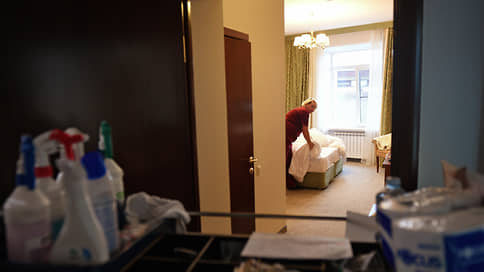Hotels have straightened out the reservation
[ad_1]

During the year that Booking.com was absent from the Russian market, none of the local online hotel booking services managed to take a significant part of the vacated share. Now hoteliers sell almost half of the rooms through direct sales, offering prices lower than online travel platforms. However, hotel owners expect the market to expand, noting the growth in sales of Ostrovok.ru and Yandex Travel services.
From January to mid-March 2023, the share of direct sales of hotel rooms by hoteliers on average in Russia amounted to 52%, an increase of 28 percentage points year-on-year, Travelline calculated for Kommersant. At the same time, the share of hotel bookings with online travel agencies (OTA) has decreased from 76% to 48% over the same period. Bnovo notes that the volume of direct sales of rooms by the hotel owners themselves has tripled, now this channel accounts for up to 74.25% of the total volume sold.
Mostly Russians book rooms on the hotel website or by phone, says Bnovo CEO Valentin Miklyaev. The head of Kontur.Hotel, Anna Satdarova, noticed a threefold increase in the share of bookings from hotel websites over the year. Maxim Brodkovsky, CEO of Azimut Hotels Company, says that direct booking now accounts for more than a third of all sales of the chain. The President of Cosmos Hotel Group, Alexander Biba, speaks of a 60% year-on-year increase in traffic to the hotel chain’s websites.
The redistribution of sales channels in the hotel segment began after Booking.com and foreign hotel operators with their own booking systems left the Russian market last March. Commonwealth Partnership partner Marina Smirnova says that until last spring, these two channels accounted for 55% of all room sales in branded hotels. Travelline notes that in January-March last year, an average of 57% of rooms were sold through Booking.com, the share of other services was 19%.
The growth of direct sales after the departure of Booking.com in Travelline is associated with better prices for accommodation on hotel websites. Now there is no practice of price parity (best price guarantee) introduced by Booking.com, and online travel agencies operating now have to compete with each other and hotels on market terms, explains Anna Sabirova, CORE.XP consultant. According to her, the commission charged by OTA from hoteliers is 10% on average. While Booking.com had this figure at 18%, adds Ms. Smirnova.
Hoteliers traditionally consider the direct channel more reliable, Travelline notes. Valentin Miklyaev says the same thing: “There is a certain distrust of hoteliers in the way OTAs work.” Maxim Brodkovsky, however, does not rule out a possible enlargement of the segment of online travel agencies. “There are applicants who have the resources and tools to take a share of the departed Booking.com,” he says.
MTS Travel CEO Vadim Melnikov also expects OTA to become the main sales channel, arguing that it is more convenient for users. Participants of this market, according to him, are now actively investing in the product and marketing. “Given the growing competition, the cost of attracting customers to the site for hotels will only increase, and after a while, for many of them, cooperation with OTA will again be more profitable than direct sales,” the expert believes. According to Travelline, now the leader among Russian online hotel booking services is Ostrovok.ru, which accounts for 25.05% of all OTA sales, and Yandex Travel (16.17%).
Yandex Travel believes that presence on the platform improves the performance of hotels: according to the company, during the high season, 65% of users visit only OTA sites, 10% – only hotel sites. Ostrovok.ru believes that it is beneficial for accommodation facilities to cooperate with OTAs, which ensure high sales rates: direct sales involve additional staff costs, and not every hotel can effectively promote its services on its own.
[ad_2]
Source link





